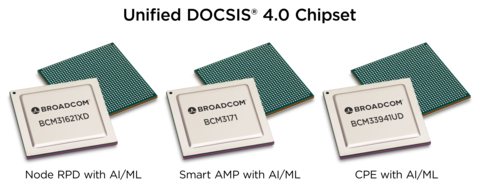Comcast and Broadcom have jointly announced a pioneering initiative to develop the world’s first AI-powered access network, marking a significant step forward in the evolution of connectivity technology. The collaboration aims to embed artificial intelligence (AI) and machine learning (ML) directly into nodes, amplifiers, and modems that constitute the final segments of Comcast’s network. This innovative approach will transform operations by automating essential network functions, leading to improved customer experiences through more actionable intelligence.
The key innovation in this collaboration is a new chipset that incorporates AI and ML capabilities, enhancing network performance, diagnostics, monitoring, maintenance, cybersecurity, and customer support. These functionalities will be achieved while reducing network latency and ensuring stringent privacy standards.
In addition to AI and ML integration, this groundbreaking chipset will also incorporate DOCSIS 4.0 Full Duplex (FDX) and Extended Spectrum (ESD) technologies. DOCSIS 4.0 is the next-generation network technology that promises symmetrical multi-gigabit internet speeds, lower latency, and enhanced security and reliability, all without significant infrastructure overhauls.
Comcast’s Chief Network Officer, Elad Nafshi, emphasized the significance of this advancement: “The Xfinity 10G Network leverages cutting-edge technologies to meet our customers’ evolving connectivity needs. This Unified DOCSIS4 chipset from Broadcom allows us to deploy transformative AI network capabilities alongside multi-gig speeds. It’s a crucial technology for Comcast, offering options for the industry when upgrading their network components for DOCSIS 4.0.”
The new chipset’s capabilities include smarter network performance decisions, enhanced monitoring, predictive maintenance, improved cybersecurity, customer assistance, and monitoring of home IoT devices. These features, enabled by AI and ML, ensure a superior broadband experience for consumers.
Rich Nelson, Senior Vice President and General Manager of Broadband Video Group at Broadcom, explained, “By offering a toolkit that includes FDX, ESD, or both simultaneously, this Unified DOCSIS4 chipset integrates the advantages of both technologies, leading to economies of scale and a common retail modem for the industry. It enhances network intelligence and reliability, creating an improved broadband experience with enhanced privacy protection and cybersecurity for consumers.”
Comcast and Broadcom are developing the new chipset based on CableLabs’ DOCSIS 4.0 specifications. The collaboration builds upon their history of pioneering innovations, including the world’s first full-duplex multi-gigabit symmetrical test in 2021 and successful tests of Full Duplex DOCSIS 4.0 system-on-chip (SoC) cable modems in 2022. Trials for the new chipset are expected to commence in early 2024, with deployment in live networks slated before the end of the same year.










